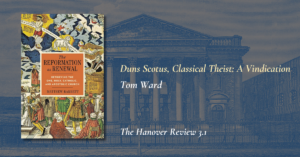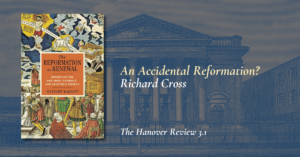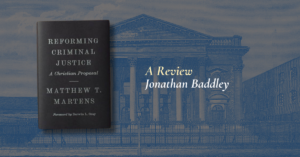Introduction
Baptists have long asked the question, “what does it mean to be a Baptist?” E. Y. Mullins was the president of The Southern Baptist Seminary from 1899 to 1928 and argued that soul competency was Baptists’ “mother principle.”[1] According to Mullins, the competency of the soul in religion means “the right of private judgment in religious matters and in the interpretation of the Scriptures.”[2] Mullin’s view emphasized “the right of private interpretation and obedience to the Scriptures”[3] against “all human interference, such as episcopacy.”[4] Mullins closely linked his idea of soul competency with religious liberty explaining the political significance of soul competency was “the separation of church and state.”[5] Mullins is not alone in his assessment of religious liberty. Indeed, religious liberty has long been part of the Baptist story. Consider Roger Williams (1603-1683) who was a Puritan minister that eventually helped found the Providence Plantations (later the Colony of Rhode Island) on the idea of liberty of conscience. While in Providence he founded the first Baptist Church in America in 1638. He later published The Bloudy Tenet of Persecution for Cause of Conscience in 1644, which was a defense of religious liberty. Between Williams and Mullins, Baptists have long seen religious liberty as key to understanding Baptist identity. However, Thomas Patient (1591-1666) would disagree with Mullins’ conclusions. He planted the first Particular Baptist churches in Ireland and did so for different reasons than soul competency or religious liberty. Therefore, I intend to argue that contrary to Williams, Mullins, and much of contemporary Baptist thought, that religious liberty is not the Baptist “mother principle.” I do this by examining Patient’s ministry which provides clarity as to the original understanding of what it means to be a Baptist. For the sake of clarity, my argument is not the overly provocative thesis that soul competency or religious liberty is completely unimportant for the Baptist story—it very much is. However, it should not be elevated to the “mother principle” as those like Mullins have maintained.
Lessons from Patient’s Relationship to Government
While Baptists have long prized religious liberty, Thomas Patient’s relationship with the government calls into question our assumption that Baptists have always prioritized religious liberty. There are three key experiences and one example from his written works that prove Patient would not have viewed religious liberty as central to Baptist identity.
The first proof that Patient did not prize religious liberty is found from his experience in the American colonies, where Thomas and his wife Sarah Patient came in the 1630’s and remained as late as 1643. While there they held to the New England faith which was marked semi-separatism and congregationalism and deeply wrestled with a debate over believer’s baptism versus infant baptism. Patient eventually became convinced of believer’s baptism and a warrant was issued for his arrest.[6] Even though he experienced religious persecution for his baptistic doctrine, there is no record of him using the experience to advocate for religious liberty. These were years that Williams was also in New England and beginning to advocate for religious liberty which proves that Patient either did not find the approach of Williams preferrable or was unaware of his specific arguments.
The second reason is that Patient had a note-worthy experience with the English government in 1650. John Owen preached a sermon before parliament on February 28, 1650 titled “Steadfastness of Promises, and the Sinfulness of Staggering.” Owen explained, “there was, for the present, one gospel preacher for every walled town in the English possession of Ireland.”[7] In the sermon he requested funds in order to send pastors to Ireland to preach the gospel. Thomas Patient was one of the men who went to Ireland as an army chaplain. Therefore, this is an example of the English government funding a Baptist pastor to go to another country to serve as both an army chaplain and to plant baptistic churches! If Patient held strongly to religious liberty in 1650, would he have taken government money in order to plant Baptist churches? At the very least, this is not the contemporary understanding of a separation of church and state and would be foreign to the understanding of those like E.Y. Mullins.
The third proof derives from when Charles Fleetwood was installed as the Lord Deputy of Ireland in 1651. He was an Independent, but he welcomed Baptists into leadership. Brown explains that by 1655 “at least twelve governors of towns and cities, ten colonels, three or four lieutenant-colonels, ten majors, nineteen or twenty captains, two salaried preachers, and twenty-three officers on the civil list” were of the Baptist faith.[8] They had risen to political prominence, but their goals seemed less about religious tolerance and more about nudging the balance of power in their favor. In fact, these realities led to other groups becoming suspicious of the Baptists, which was a factor in Fleetwood losing his position to Henry Cromwell in 1655. Patient appears to have been part of a push for a Baptist religious settlement rather than being an advocate for religious liberty. This is another example from his ministry of the early Baptists not advocating for religious liberty even though they were in positions of political power.
Finally, Patient received criticism for his positions on baptism and how to organize a church. As a result, he wrote a full-length book on the doctrine of believer’s baptism titled On the Doctrine of Baptism, And the Distinction of the Covenants.[9] In his book he made the case that “it is the duty of every man that believes and repents, to be baptized.”[10] In his book, Patient makes no mention of religious liberty. Further, he did not write a book on religious liberty as the organizing principle of Baptist churches. Rather, he advocated believer’s baptism by immersion as the doctrine by which Baptist churches should organize. Therefore, according to Thomas Patient, being a Baptist meant holding to regenerate church membership through believer’s baptism by immersion and not holding to religious liberty.
The Central Mark of a Baptist from Patient’s Organizing Principles
Even though Thomas Patient did not hold to our contemporary understanding of religious liberty, he did plant the first Baptist churches in Ireland. If soul competency and religious liberty were not hallmarks of his ministry, what doctrine did he organize those churches around? A letter sent in 1651 from his church to another congregation helps answer the question. Patient and eleven men from his Baptist church sent a letter to another congregation rebuking them for joining together in “fellowship with such as do fundamentally differ in judgement and practice; to wit, such as agree not with you about the true state of a visible Church, nor the fundamental Ordinances thereof.”[11] Patient organized his church around the doctrine of regenerate church membership through believer’s baptism. Further, he and his church rebuked another congregation that did not likewise organize their church according to the same doctrines. Therefore, based on this evidence I argue that Baptists’ mother principle is regenerate church membership and not soul competency.
Conclusions for Baptist Identity
I hope this historical evidence adds to the conversation over Baptist identity. It is true that history shows that Baptists (particularly American Baptists) have long advocated for religious liberty. This history is to be understood and celebrated. As Baptists, we should continue our ministry of advocating for religious liberty. However, soul competency is not our “mother principle.”[12] One need only look to Thomas Patient as one who would not understand religious liberty as Baptists key organizing principle. Baptist identity is linked to our conviction that the Bible teaches genuine converts are to publicly profess their faith in Christ by being immersed. Those who are baptized by immersion as believers are the ones who should make up the visible church. It is this doctrine that is necessary to Baptist identity. Therefore, regenerate church membership through believer’s baptism is the Baptist distinctive.
[1] E. Y. Mullins, The Axioms of Religion, Library of Baptist Classics 5 (Nashville: B & H, 1997), 79.
[2] E. Y. Mullins, The Axioms of Religion, Library of Baptist Classics 5 (Nashville: B & H, 1997), 62.
[3] E. Y. Mullins, The Axioms of Religion, Library of Baptist Classics 5 (Nashville: B & H, 1997), 66.
[4] E. Y. Mullins, The Axioms of Religion, Library of Baptist Classics 5 (Nashville: B & H, 1997), 65.
[5] E. Y. Mullins, The Axioms of Religion, Library of Baptist Classics 5 (Nashville: B & H, 1997), 67.
[6] Records and Files of the Quarterly Court of Essex County Massachusetts, vol. 1. 1636-1656, (Essex Institute: Salem, Massachusetts, 1911) 52.
[7] Thomas Russell (ed.), The Works of John Owen, D.D. vol. 1 (London: Richard Baynes, 1826), 91.
[8] Louise Fargo Brown, The Political Activities of the Baptists and Fifth Monarchy Men in England During the Interregnum. (Oxford: Oxford University Press, 1912) 136-137.
[9] Thomas Patient, On the Doctrine of Baptism, And the Distinction of the Covenants. (Henry Hills: London, 1654).
[10] Patient, On Baptism, 5.
[11] John Rogers, Ohel: A Tabernacle for the Sun: or Irenicum Evangelicum, An Idea of Church-Discipline. (London, 1653) 302.
[12] Mullins, The Axioms of Religion, 79.



